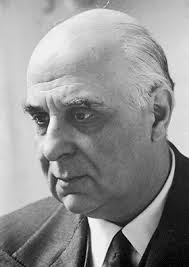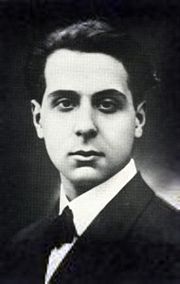I am delighted to have received a guest post from Marina Marinopoulos. The subject is the Greek Poet, Georgios Seferis. Her own attractive and informative blog can be found via this link.
https://athensletters.com/
A great poet: Giorgos SEFERIS
I’ve kept a rein on my life, kept a rein on my life, travelling
among yellow trees in driving rain
on silent slopes loaded with beech leaves,
no fire on their peaks; it’s getting dark.
I’ve kept a rein on my life; on your left hand a line
a scar at your knee, perhaps they exist
on the sand of the past summer perhaps
they remain there where the north wind blew as I hear
an alien voice around the frozen lake.
Giorgos Seferis, ‘Epiphany’ [excerpt]
Greece can boast of many great poets, such as Constatine Cavafy, Andreas Kalvos, Kostis Palamas, Angelos Sikelianos, Yannis Ritsos and others. Two of these, Giorgos Seferis in 1963 and Giorgos Elytis in 1979, received the ultimate accolade: they both won the Nobel Prize for Literature.
Seferis, whose real name was Giorgos Seferiadis, was born in Smyrna (Izmir) in 1900. During WWI, when he was 14, the family moved to Athens.
Smyrna was taken by the Turks in 1922, a catastrophe that affected Greece in many ways, not least because a million and a half refugees had to be integrated into a new country with a population of barely four and half million. The economic, political and social repercussions were enormous, as was the turmoil in culture and ideology. Seferis, having left in 1914, was not able to return until 1950. The sense of being an exile from his childhood home deeply affected him, and so it’s not surprising that he identified with the story of Odysseus, told by the great epic poet Homer, in which a hero of the Trojan War is forced to wander the seas for ten years whilst he attempts to find his way home. Seferis was a wanderer himself, since he had a long and successful diplomatic career, travelling to many different countries as the Greek Ambassador.
Seferis was a Hellenist and a humanist. His poetry attempts to highlight a unifying strand of humanism which endures in Greek culture and literature. His feeling of being in exile informed much of his poetry, but he was also greatly influenced by Cavafy, Ezra Pound and T. S. Eliot (he translated The Wasteland into Greek in 1936).
In 1963, Seferis was nominated and won the Nobel Prize for Literature, with a unanimous vote on a short list that included W. H. Auden and Pablo Neruda. In his acceptance speech, he explained his desire to find continuity between the cultures of ancient and modern Greece through his own personal interest in humanism, by adapting a famous Greek myth: ‘When on his way to Thebes Oedipus encountered the Sphinx, his answer to its riddle was: ‘Man’. That simple word destroyed the monster. We have many monsters to destroy. Let us think of the answer of Oedipus.’
Upon his death in 1971, Seferis became an important symbol of resistance against the repressive right-wing regime which governed Greece between 1967 and 1974. At his funeral huge crowds followed his coffin singing the words of his poem Denial, which was banned at the time. The poem itself conjures a romantic vision of a Greek seashore, but, as is characteristic of his work, with a human story at its heart.

DENIAL (my own translation)
At the secret shore
White as a dove
We thirsted at noon;
But the water was salt.
On blond sand
We wrote her name;
But a sea-breeze blew in
And the script was erased.
With what a heart, what breath,
What desire and what passion
We lived our life; a mistake!
And our life was altered.
This poem, about thwarted hope and the obstacles life places in our way, was written by Seferis when he was around 25. It was later set to music by another famous Greek, musician Mikis Theodorakis. You can listen to it on the following YouTube link, as sung by Maria Farantouri.
Posthumously, Seferis’ place in Greek culture was demonstrated by the inclusion of a very famous stanza from his Mythistorema in the 2004 Athens Olympics Opening Ceremony. It is about legacy being a mixed blessing – both a treasure and a curse.
I woke with this marble head in my hands;
it exhausts my elbow and I don’t know where to put it down.
It was falling into the dream as I was coming out of the dream
so our life became one and it will be very difficult for it to separate again.
Sixteen years later, another great poet, Giorgos Elytis, would follow in Seferis’s footsteps by also winning the Nobel Prize, against such luminaries as Doris Lessing and Graham Green.
I’ve kept a rein on my life whispering in a boundless silence
I no longer know how to speak nor how to think; whispers
like the breathing of the cypress tree that night
like the human voice of the night sea on pebbles
like the memory of your voice saying ‘happiness’.
Giorgos Seferis, ‘Epiphany’
Epiphany was translated by Edmund Keeley.


Such luminaries Pete and Marina. Thanks for exposing me to their work.
LikeLike
Thanks for the comment, Robyn. I have Marina to thank, as I had never heard of him before her guest post.
Best wishes, Pete.
LikeLiked by 1 person
I’m so glad you enjoyed it, Robyn.
LikeLiked by 1 person
Εxcellent post, you two!Kudos to both of you!A lovely tribute to Seferis!
LikeLike
Thanks very much for your comment, Sofia. All credit to Marina, for an enlightening post.
And thanks also for following my blog, which is much appreciated.
Best wishes, Pete.
LikeLiked by 1 person
😉
LikeLike
Thank you, Sofia🌞
LikeLiked by 1 person
Reblogged this on Letters from Athens and commented:
It was lovely being asked to write a guest post by Pete. Take a look at his blog, Beetleypete, where he writes about his walks around Norfolk with his dog Ollie, and about a lot of other stuff.
LikeLike
Thanks for the mention with the re-bog, Marina. Much appreciated.
Best wishes, Pete.
LikeLiked by 1 person
Many thanks for inviting me, Pete. It felt funny to ‘like’ my own post, but I have reblogged. Best wishes, Marina
LikeLike
It was a pleasure, and so well-received too!
Regards, Pete.
LikeLiked by 1 person
I did not know of this man. He lives on in your post. Thanks!
LikeLike
Many thanks for that. I also had never heard of him, so I am grateful to Marina for the introduction.
Best wishes, Pete.
LikeLike
I have no idea how well known Seferis is outside Greece. I think it’s difficult to read poetry in translation, often the particular flavor of the language, the pace, the musicality don’t come through. Some translate better than others.
LikeLiked by 1 person
I am only bi-lingual. I prefer Spanish poetry in the original language. There is a word play and, as you said, musicality that often does not come through.
LikeLiked by 1 person
Lovely poetry and an interesting post by your guest. It’s cool to hear about other lands and cultures, best thing about the blogosphere I think.
LikeLike
Indeed so, FR. I am very happy to present this guest post from Marina.
Best wishes, Pete.
LikeLiked by 1 person
Thank you. It’s something I really enjoy, too.
LikeLiked by 1 person
Beautiful words to go along with this lovely post. Very nice job, Pete..
Take care, Laura
LikeLike
Thanks, Laura. We have to thank Marina for compiling such an interesting post.
Best wishes, Pete.
LikeLiked by 1 person
I’m glad you enjoyed it, Laura. It was lovely of Pete to invite me!
LikeLiked by 1 person
Excellent post, you two. “Greece can boast of many great poets, such as Constatine Cavafy, Andreas Kalvos, Kostis Palamas, Angelos Sikelianos, Yannis Ritsos and others. Two of these, Giorgos Seferis in 1963 and Giorgos Elytis in 1979, received the ultimate accolade: they both won the Nobel Prize for Literature.” I would add to the list Stratis Haviaras. His poetry and novels are haunting and beautiful. I’d like to share an old post regarding his novel “When the Tree Sings.”
Believe it or not, he wrote me back in the comment section!
LikeLike
Thanks very much for the link and comment, Cindy. I have no doubt that we will both enjoy reading your post.
Best wishes, Pete.
LikeLiked by 1 person
Opa!
LikeLike
How nice! Of course there are many other poets I did not mention, as the list would have become boring!
LikeLike
You taught me a lot. I only knew,one. 🙂
LikeLike
And I’ve learned to like another poet. Thank you for the lesson, Pete.
LikeLike
Thanks are due to Marina, GP. I am very happy to hear that you liked it.
Best wishes, Pete.
LikeLiked by 1 person
Glad you enjoyed it, GP.
LikeLike